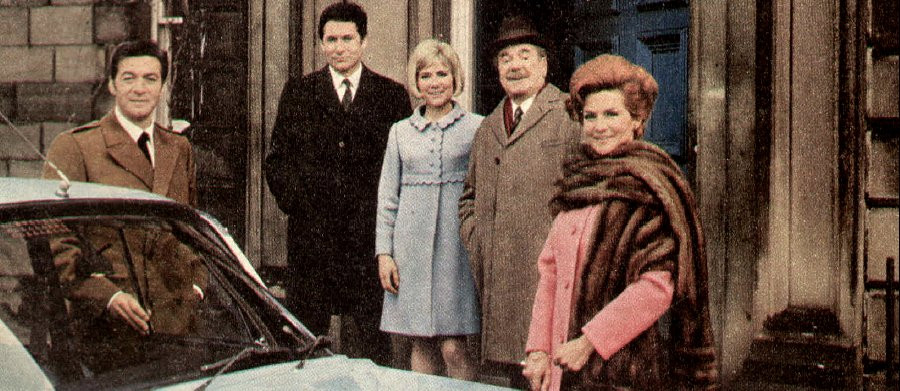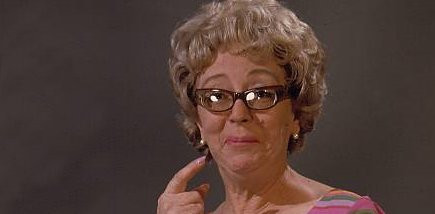
Terence Feely
Terence Feely was, without doubt, one of the most prolific scriptwriters of that dubiously tagged "Golden Age" of British television. During the 1960's he helped to create and develop some of the best-remembered names on the small screen. Many of his scripts are today regarded as "Cult Classics" around the world and, through syndication and DVD sales, have experienced appreciation and popularity from more than one generation of fans. His contribution to television history is no small one.
Terence John Feely was born into a middle-class industrial family in Liverpool, England, on July 28th 1928. From an early age Terence was taken with a passion for the use of English language and on leaving school he entered Liverpool's Jesuit College. Here he studied English and psychology, both of which would stand him in good stead later on in life when he turned to the creation of well-rounded and believable fictional characters. On completion of his university studies, he decided to go into journalism and applied for, and was rewarded with a job for a small local newspaper in Middlesborough. However, he quickly outgrew the publication and moved to London where he secured a position in the faster paced world of Fleet Street, joining the editorial staff of 'The Sunday Graphic.' It was around this time that Terence began to write submissions for film scripts and in 1955 the great film director Alfred Hitchcock purchased the rights to one of these, entitled Heartbeat.
For the 27 year-old Feely this was a great boost to his self-esteem as well as to his future career as a full time scriptwriter. Terence then moved into the world of the theatre, with his play Shout for Life going into production in London's West End. However, many of his fellow journalists seemed to resent his success and aspirations, the play did not perform particularly well at the box-office, and Feely found himself the target of much criticism from his fellow professionals.
Veteran TV producer Richard Broke remembers the period: "I was an assistant stage manager (ASM) on this production. The play - which starred Roland Culver, Ursula Howells, William Franklyn and Bernard Lloyd - went on an extensive out-of-town tour. It was at that point called Sergeant Dower Must Die. Bill Franklyn, a lovely man, was hopelessly miscast as a Greek/Cypriot general and altered his performance and his accent almost every night! Roland Culver played the British Prime Minister and hated every minute of it. The leading part was the one played by Bernard Lloyd - a complete unknown at that time. Bill Treacher, who went on to fame in 'Eastenders', was also in the cast. The director was Colin Graham, an opera director and a great buddy of Benjamin Britten.
"The reviews were terrible - quite possibly for the reason you give. Feely was a journalist at the time and I remember being told, before we opened at the Vaudeville Theatre, that "the other hacks will crucify him" - and so they did. But something else which contributed to the debacle was the appalling behaviour of Roland Culver who told the entire membership of the Garrick Club and anyone else who would listen that he was currently appearing in a total disaster. It closed after a week!
Obviously an actor announcing in the Garrick that he was playing in a turkey wouldn't affect the box office. The strong suspicion at the time - totally unproven - was that he was quietly dripping poison into the ears of the critics before it opened. He couldn't leave the production for contractual reasons but he was not exactly disappointed when it closed so abruptly. I remember the director, Colin Graham, being very pissed off with him and it was real bad luck on Bernard Lloyd, a promising young actor for whom this was his West End break.
But the other side of it - the fact that fellow journalists had no great love for Terence Feely and wanted to duff him up - is equally important. Odd - that aspect of it. Nobody did that to Michael Frayn, and Nicholas de Jongh wrote a play and emerged unscathed."
By this time Terence was married (to Elizabeth) and needed to secure a future for himself and ventured into the new and exciting world of television.
"I was in at the start of The Avengers with and Ian Hendry. Then we dropped Ian Hendry and left it to Honor and Pat." - Terence Feely
Terence wrote two episodes for that first season of The Avengers in 1961; Nightmare, in which Dr Keel (Hendry) is shot in a kidnap attempt and almost loses his life, and Dragonsfield, in which Steed investigates sabotage at a research centre where scientists are working on a radiation shield for space exploration.
In an interview in the early 1990's Terence spoke of how the unique Avengers style came about:
"The Avengers was done live. The sets shook, doors didn't open and people tripped over things. The wisecracking mode that the filmed series exploited developed from those awful mistakes. If a door wouldn't open, instead of being phased, Pat would do something with his brolly or his bowler hat, or make some fast remark, and Honor would do the same. Writers recognised that talent and began to write for it. It became a style which was too good to lose and it was built into their characters."
Terence's involvement with the series did not go beyond the live episodes and he moved on to other popular shows of the time including The Saint and Gerry Anderson's highly rated puppet series, Thunderbirds. He then became story editor for Armchair Theatre and was instrumental in bringing James Mitchell's Callan to the small screen, and he also story edited ATV's Mystery and Imagination series. Around this time he also discussed an idea he had for a movie with Danger Man actor Patrick McGoohan. The idea never came off, but McGoohan approached Terence again to write scripts for his new television project.
"Pat said to me that he had a television series where you can do just about anything you like, he didn't know what it was about, the writers would decide that when they start writing it. I said 'Do you mean the kind of surrealistic television where we can get away with anything?' He said 'Yes, I reckon that is what I'm talking about.' My brain's always been slightly off key, I've always seen things that other people don't and so the idea interested me and because it had never been done before." That series was, of course, The Prisoner.
The result of that conversation with McGoohan was an episode entitled The Schizoid Man. "I just went off and wrote it and it's one of the few scripts I've ever done that didn't need a second draft. That was the nice thing about The Prisoner; you didn't have to go into nit-picking justifications. If the thing was exciting and if it worked as television theatre, then you did it." The second story that Terence wrote for the series was a very surrealistic tale called The Girl Who Was Death. In it Number 6 leaves the village in pursuit of a young woman. By the end of the tale it is revealed that the entire episode is nothing more than a bedtime story that he is reading to some children. On reading the script Patrick McGoohan was so impressed that he asked Terence to develop the story into a ninety-minute script. The idea was to get Lew Grade to put up the money for a full-length feature film. However, Grade refused to back it and the film idea was dropped. Shortly afterwards Grade also ordered the cancellation of 'The Prisoner' and so Terence never got another chance to write for it again.
For the next decade Terence was constantly busy working on shows such as The Persuaders, Arthur of the Britons, The Protectors, The New Avengers, UFO and Space: 1999.
"I remember Space: 1999 for a wonderful character called Freddie Freiberger. I thought he was having me on when he introduced himself. He was Story Editor and he was a great old Hollywood pro. There was nothing he hadn't seen, nothing he hadn't heard, no joke you could tell him that he couldn't give you the punchline to. I adored old Freddie and I got on with him like a house on fire."
The first episode that Terence wrote for this particular Gerry Anderson series was called New Adam, New Eve and on the strength of it Gerry Anderson commissioned a two-parter from Terence, entitled The Bringers of Wonder.
"I did it and they loved it. Then I went away on holiday for a month while it was being shot and when I came back I said to Gerry 'How did it go?' It was a great script and he thought it was too, He said, 'Terence, what can I tell you? A lot of very heavy editing went on, I'm afraid, while you were away.' And I said, 'Well, Gerry, you weren't away!' He said, 'I know, I don't want to go into it all, but there was nothing I could do.' We did lose a hell of a lot of good stuff out of that and I do remember being very annoyed when I saw what they'd done with it."
Following this, Terence went on to write for many popular television shows including the comedy Robin's Nest and the BBC detective drama Bergerac. There was a reunion with Honor Blackman when she appeared in a TV movie written by Terence called Who Killed Santa Claus? and in the 1980's he worked with Diana Rigg in his dramatisation of the Barbara Cartland novel A Hazard of Hearts. In 1979 he created the detective series The Gentle Touch and its spin-off series in 1985, C.A.T.S Eyes. In 1984 he wrote a mini-series called The Mistral's Daughter. Terence had a lifelong admiration for novelist Henry James and scored another television movie hit with his adaptation of James' novel, Affairs of the Heart. His own book, Number 10, recounted the lives of 7 of Britain's Prime Ministers and became an acclaimed drama series. One of his last novels, Limelight, was awarded New York's Book of the Year prize, but Feely, approaching semi-retirement, chose not to adapt it for the screen. On 13 August 2000 Terence Feely passed away at the age of 72.
Adaptable, professional to a fault, and possessing a rare insight and wide-ranging creative imagination, Terence Feely's contribution to genuine quality British television across almost five decades is beyond dispute. In an age when consistently good writing is in the domain of an increasingly small number of professionals, Feely's impressive body of work stands as both a monument to his talent, as well as a continuing inspiration to those who aspire to follow in his footsteps.
Published on February 20th, 2019. Written by Laurence Marcus (2001) with contributions from Richard Broke (2008). for Television Heaven.










